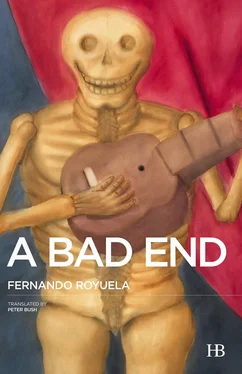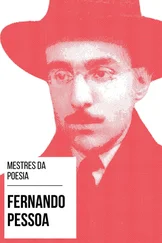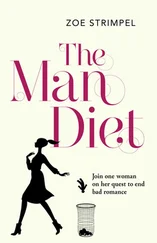Fernando Royuela - A Bad End
Здесь есть возможность читать онлайн «Fernando Royuela - A Bad End» весь текст электронной книги совершенно бесплатно (целиком полную версию без сокращений). В некоторых случаях можно слушать аудио, скачать через торрент в формате fb2 и присутствует краткое содержание. Год выпуска: 2016, Издательство: Hispabooks, Жанр: Современная проза, на английском языке. Описание произведения, (предисловие) а так же отзывы посетителей доступны на портале библиотеки ЛибКат.
- Название:A Bad End
- Автор:
- Издательство:Hispabooks
- Жанр:
- Год:2016
- ISBN:нет данных
- Рейтинг книги:3 / 5. Голосов: 1
-
Избранное:Добавить в избранное
- Отзывы:
-
Ваша оценка:
- 60
- 1
- 2
- 3
- 4
- 5
A Bad End: краткое содержание, описание и аннотация
Предлагаем к чтению аннотацию, описание, краткое содержание или предисловие (зависит от того, что написал сам автор книги «A Bad End»). Если вы не нашли необходимую информацию о книге — напишите в комментариях, мы постараемся отыскать её.
A Bad End — читать онлайн бесплатно полную книгу (весь текст) целиком
Ниже представлен текст книги, разбитый по страницам. Система сохранения места последней прочитанной страницы, позволяет с удобством читать онлайн бесплатно книгу «A Bad End», без необходимости каждый раз заново искать на чём Вы остановились. Поставьте закладку, и сможете в любой момент перейти на страницу, на которой закончили чтение.
Интервал:
Закладка:
Cambrón, with me trailing in his wake, arrived just when the old crock chairing the session, a guy with a shiny skull that looked like he’d come straight out of a niche, was making a speech underlining the crucial importance of militant resistance in “these moments of open political struggle against the mummified perpetuation of the Caudillo’s gang in naked connivance with the big banks to crush the dignity of the working people.” It was strange to see such a big crowd in that space; something unusual was in the offing, no doubt, but Ceferino had told me nothing. We cut a path through the throng to be nearer to the table. I clung to his legs and twisted with his every movement while simultaneously avoiding like the plague being stamped upon or anyone stubbing their cigarette out in my hair. Huge conglomerations are generally an extra obstacle when it comes to dwarf mobility, and though I’d become something of an expert in the field, I still retained the odd memento in the shape of a broken bone, a finicky muscle, or scar. We sat in the front row. The atmosphere was extremely fuggy, and even at my height it was hard to inhale any real oxygen. The stench had never been so pungent in the Trinitarians’ or reeked as vilely in the cages of the Stéfano circus. That was the scent blossoming from the proletariat. I leaned back on Cambrón’s knees and prepared to swallow everything being said. Next to me, a little to my right, a woman with bulbous breasts and rotund hips was hanging on the raw-granite words issuing from the speakers’ lips. That was my impression of Blond Juana the first time I saw her. I could tell you that she wore her hair cut short in the male fashion, that she wore jeans into which she’d tucked a collarless shirt, or that she’d wrapped an extravagantly flowery foulard round the firm flesh of her neck, though the flowers hadn’t seen any water recently, judging by the smell. I could tell you how intently she listened or how young she looked, for all that stood out in such a geriatric gathering; but what can I really say, if the first thing I noticed were her bulbous breasts and the rotund expanse of her hips, which segued into a grandiose pair of spherical buttocks to boot?
Though she felt I was totally repulsive, over time I would be acquainted with her to an extent you’d never suspect. What’s more, if it could ever be said that I was really in love, after my sad fluttering heartbeats for little Margarita, then Blond Juana was it. She’d have become a true daughter of the people, of the people and for the people, if her heroism hadn’t been cut short in its prime. She came to Madrid as a girl, brought by migrant parents who ended up working as porters in a snobby building in the Salamanca district. She’d been educated in a nearby convent school after the astonishing efforts her mother made to secure her free enrolment. References, letters, and guarantors weren’t enough, and a distant relative had to be called on, who was one of the hunting Caudillo’s beaters, and he collected his commission in caresses. Rooted in the rural back of beyond and surrounded by so many straitlaced ninnies, Juana turned out on the wild side and learnt in her own flesh that the way this bitch of a world treats you depends on where you were born. She was coarse, coarse and wild, yet her cheeks reddened like poppies when anger or desire was driving her, or whenever she tired of shouting revolutionary slogans on street corners, was out of puff, and fell apart drinking wine in bars. I remember that first night, when I sidled up to her, how she smelt as bitter as an artichoke, yet I felt she was sweet, as if condensed milk, not blood, coursed through her veins; later, when I finally got a lick, it was no longer so thick or so sugary, that taste of bitterness I’d already divined was all there was left.
That old talking skull didn’t stop evincing depths of dialectic that were difficult for a novice like me to digest, and rather than struggling to understand, I turned my head and, out of the corner of my eye, admired the strikingly female profile Juana used to promote her powerful presence. The rhetoric from the table went in one ear and out the other, didn’t interest me at all — neither class conflict, the attractions of a clean break, nor victory in the final struggle — my concerns were limited to the carnal variety, and I’m not suggesting at this stage that such longings have deserted me forever, but simply that as you grow older, these desires subside, before finally vanishing completely, I suppose, down the sewer of senility. Juana’s body was warm, soft, and fresh and called to be relished the way bakers try out their bread — namely, with their mouths. I later discovered that following her creed, fancies, or convictions, it was an open secret that she willingly yielded to comrades who wanted it, something that fuelled my hopes, though where dwarves are concerned, promiscuity only goes so far, and my turn never seemed to come. I imagined her in her birthday suit the whole time that guy on the podium spouted his rock-hard doctrines. When he finally shut up, the corners of his mouth flecked with dry saliva, something totally unforeseen happened. Yet again, a preeminently sarcastic Providence erupted in the flow of my life.
I was caught off guard, engrossed, one might say, in Blond Juana’s rough feminine ways, when, after the applause, the old crock chairing the session began to introduce the next speaker. He raised his voice and told us that the comrade about to speak had spent her youth fighting in the workers’ movement, that she had struggled against fascism from a range of posts in the people’s republican government and then greatly risked her life to defend her beliefs, in the mud of the trenches, shoulder to shoulder with Líster. She’d always excelled in her commitment to the revolution, and her energy had received manifold praise from her comrades, to the point that she inspired the pugnacious pen of the much lamented Blasco Castrillo to write those passionate lines in her honor: You have faith and in the trench / springtime blossoms in your faith / and hoisted like a flag / your faith stirs and exalts you. After the war, she had been obliged to go into exile in the Soviet Union and had held various posts in Moscow related to the spreading of communist thought to the countries of Latin America. She eventually moved to Havana, where she carried out equality of opportunity assignments in the Ministry of Education. Now, after thirty-seven years of exile, she’d returned to Spain in clandestine fashion to contribute with her presence to the cause of freedom. After his eulogy, the old crock proclaimed her name: Faith Oxen.
That woman was Faith Oxen. Emotion sparked and crackled in my imagination, linked to inner questioning that had never been resolved. The movements in my brain must have been intense, because by now Juana had registered my presence in the crowd and was simply staring at me, with a mixture of curiosity and repugnance. A whirlwind of reminiscences rattled the door to my memories, and when I went to open up, I found myself face-to-face with Gurruchaga and his devious silences; my first years in the Stéfano circus seeped through my perforated soul like a gas heavier than air, whose stench destroyed the will to forget. The lethargic animals, the turbid alcohol downed by pudgy Di Battista, that delicate dust in the noonday light of Córdoba where tragedy hovered in the air, the blows handed out, the book of poems discovered among the junk, with its dry, iron-specked pages, and that indecipherable dedication signed by someone also called “Faith Oxen,” and Gurruchaga bleeding on the ground, later handcuffed and taken off to placate forever the insatiable larvae beyond the grave, were the tesserae that immediately contrived to shape that immense fragment in the mosaic of my life. I still possessed that copy of the Gypsy Ballads ; it was perhaps the only thing to escape the debacle of the bailiffs the day I fled from the Stéfano circus. That item was the only thing left linking me to the events of my adolescence. I couldn’t restrain myself a moment more and tugged on Cambrón’s shirtsleeve to tell him of my anxiety. “Ceferino, I must talk to that old woman, whatever it costs.” “Shut up, Gregorio, and just listen to what they’re saying. If you like, we’ll go over there when the meeting finishes.”
Читать дальшеИнтервал:
Закладка:
Похожие книги на «A Bad End»
Представляем Вашему вниманию похожие книги на «A Bad End» списком для выбора. Мы отобрали схожую по названию и смыслу литературу в надежде предоставить читателям больше вариантов отыскать новые, интересные, ещё непрочитанные произведения.
Обсуждение, отзывы о книге «A Bad End» и просто собственные мнения читателей. Оставьте ваши комментарии, напишите, что Вы думаете о произведении, его смысле или главных героях. Укажите что конкретно понравилось, а что нет, и почему Вы так считаете.












